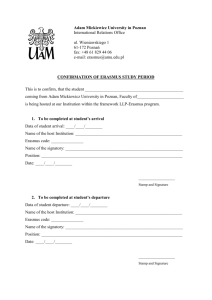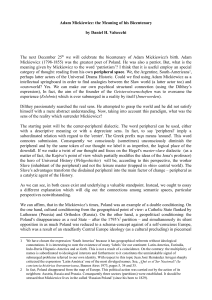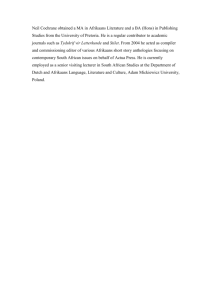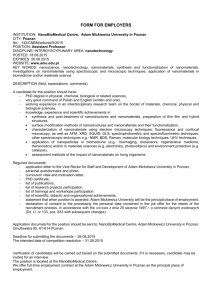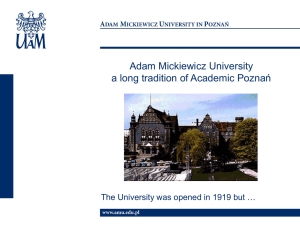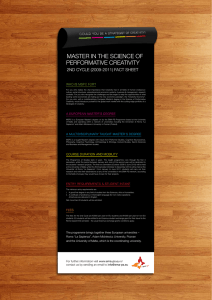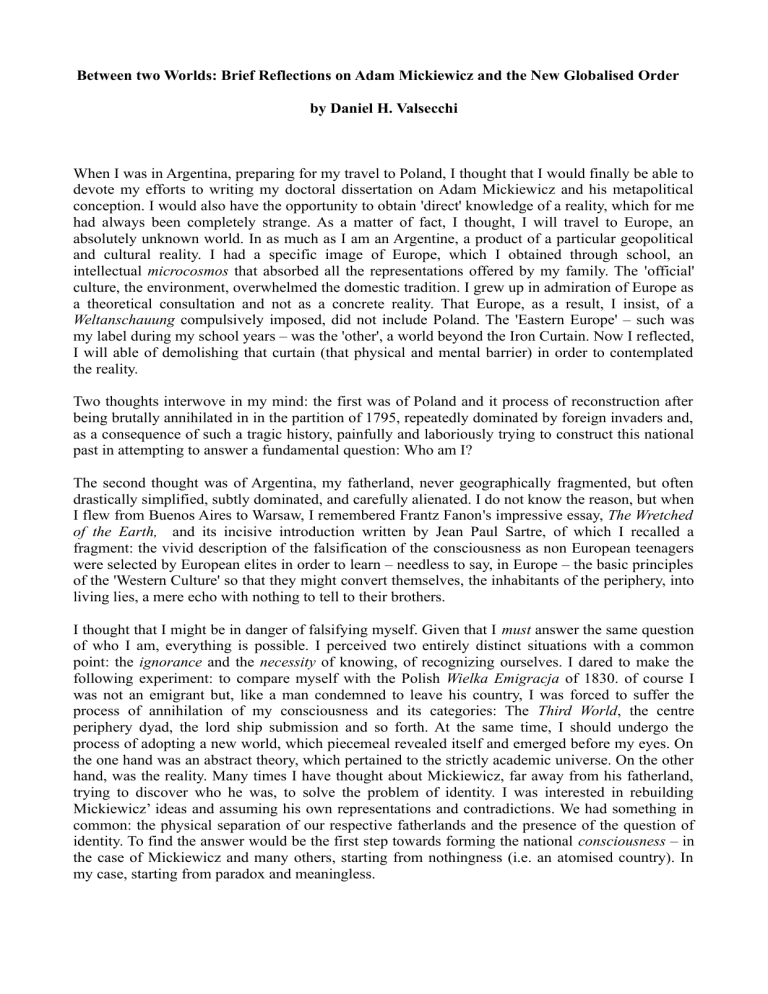
Between two Worlds: Brief Reflections on Adam Mickiewicz and the New Globalised Order by Daniel H. Valsecchi When I was in Argentina, preparing for my travel to Poland, I thought that I would finally be able to devote my efforts to writing my doctoral dissertation on Adam Mickiewicz and his metapolitical conception. I would also have the opportunity to obtain 'direct' knowledge of a reality, which for me had always been completely strange. As a matter of fact, I thought, I will travel to Europe, an absolutely unknown world. In as much as I am an Argentine, a product of a particular geopolitical and cultural reality. I had a specific image of Europe, which I obtained through school, an intellectual microcosmos that absorbed all the representations offered by my family. The 'official' culture, the environment, overwhelmed the domestic tradition. I grew up in admiration of Europe as a theoretical consultation and not as a concrete reality. That Europe, as a result, I insist, of a Weltanschauung compulsively imposed, did not include Poland. The 'Eastern Europe' – such was my label during my school years – was the 'other', a world beyond the Iron Curtain. Now I reflected, I will able of demolishing that curtain (that physical and mental barrier) in order to contemplated the reality. Two thoughts interwove in my mind: the first was of Poland and it process of reconstruction after being brutally annihilated in in the partition of 1795, repeatedly dominated by foreign invaders and, as a consequence of such a tragic history, painfully and laboriously trying to construct this national past in attempting to answer a fundamental question: Who am I? The second thought was of Argentina, my fatherland, never geographically fragmented, but often drastically simplified, subtly dominated, and carefully alienated. I do not know the reason, but when I flew from Buenos Aires to Warsaw, I remembered Frantz Fanon's impressive essay, The Wretched of the Earth, and its incisive introduction written by Jean Paul Sartre, of which I recalled a fragment: the vivid description of the falsification of the consciousness as non European teenagers were selected by European elites in order to learn – needless to say, in Europe – the basic principles of the 'Western Culture' so that they might convert themselves, the inhabitants of the periphery, into living lies, a mere echo with nothing to tell to their brothers. I thought that I might be in danger of falsifying myself. Given that I must answer the same question of who I am, everything is possible. I perceived two entirely distinct situations with a common point: the ignorance and the necessity of knowing, of recognizing ourselves. I dared to make the following experiment: to compare myself with the Polish Wielka Emigracja of 1830. of course I was not an emigrant but, like a man condemned to leave his country, I was forced to suffer the process of annihilation of my consciousness and its categories: The Third World, the centre periphery dyad, the lord ship submission and so forth. At the same time, I should undergo the process of adopting a new world, which piecemeal revealed itself and emerged before my eyes. On the one hand was an abstract theory, which pertained to the strictly academic universe. On the other hand, was the reality. Many times I have thought about Mickiewicz, far away from his fatherland, trying to discover who he was, to solve the problem of identity. I was interested in rebuilding Mickiewicz’ ideas and assuming his own representations and contradictions. We had something in common: the physical separation of our respective fatherlands and the presence of the question of identity. To find the answer would be the first step towards forming the national consciousness – in the case of Mickiewicz and many others, starting from nothingness (i.e. an atomised country). In my case, starting from paradox and meaningless. At present, surrounded by the frenetic enthusiasm on the cusp of the third millennium, it is difficult to answer this question. As I walk around of streets of Kraków, the old and the new appear simultaneously. The old in the form of ancient buildings, the magnificent churches, the monuments, the memorials to the heroes, and the new in the certainty that distance has disappeared to be replaced by supermarkets, and commercial trademarks which I had left at home in Buenos Aires, on the other side of the world. Several people say that here, in Kraków, the old and the new coexist. I disagree with this statement. Moreover, I believe that I am a witness to a fight, a terrible struggle between two worlds, of ideas 'clear and different' in themselves but very confused in the very process of interaction. By the same token, the final result, the farther 'form', is not at all clear, as in the case of the prophecy from Mickiewicz’s Dziady: that 'form' is 'prawdziwa jak rachunek i dziwna jak mara'. Once, I imagined Mickiewicz as a resurrected man, taking a walk in the present Kraków (a city which the poet never visited). I was able to see the poet watching his own monument. Even I perceived his astonishment. What would Mickiewicz say after seen the famous Cracovian melting pot? What would the first poet of Poland think, standing before memorials of martyrdom eclipsed by the dazzling luminosity and the new style of life? In truth, I do not yet know the answer. Perhaps it is fruitless to imagine the thoughts of a man who was born 200 years ago. Maybe my intellectual exercise was thoroughly useless. I myself have had the absurd experience of non place. After traveling 13.000 km, what have I found? On the one hand, and this is a terrible phenomenon, I have been confronted with the smiling nightmare scholars call globalisation. I have found the same patterns of behaviour already existent in my own country. Here, in Kraków, I have the suspicion that I am pursing a ghost. As well known, Mickiewicz never lived here. Is he a ghost? To a certain extent, yes. He is a ghost, someone who is at once present and absent. Did he know the answer of the fundamental question? Yes, he did. Unfortunately, the essence of such an answer, is, at the present time, undecipherable. Mickiewicz knew much more than us. The poet was able to talk to the Ancestors (Dziady). I cannot. Furthermore, my original patterns are completely purposeless and hollow. I am not able to associate them with anything in the 'real world'. What can I do? I think that, despite the profound academic difficulties and existential quagmires. I should rebuild Mickiewicz’s course of thought. That is the background of my doctoral dissertation. After doing this, my intellectual anguish, I hope, will disappear. Meanwhile, like the humble and expectant public of the ceremony of the Ancestors, I can only ask: 'Ciemno wszędzie, głucho wszędzie, Co to będzie, co to będzie? NEWSletter, WINTER 2000/2001 Nº 14, pages 6-7.
